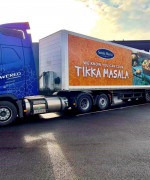
“We are seeing major advances in technology in the logistics industry that can make transport more sustainable. One of them is the renewable fuel HVO100 which is now, together with biogas, being used in our largest shipments to and from the port of Gothenburg and our internal transports, approximately 450,000 kilometres per year”, says Henrik Samuelson, SVP Scandinavia & Central Europe Paulig.
The change is done in collaboration with Paulig’s transport suppliers in Sweden; DSV, Greencarrier Freight Services, GLT/Pendeltrafiken and Geodis/GDL.
Paulig is an international, family-owned food company with a revenue of 920 million euros and operations in 13 countries. The company's products are sold in approximately 70 countries around the world. Paulig’s portfolio includes the brands Santa Maria, Risenta, Poco Loco, Gold&Green and Paulig. Santa Maria Tex Mex products are produced in Sweden (Mölndal and Landskrona), Belgium (Roselare) and the United Kingdom (Milton Keynes).
“On a global level, transport makes up a relatively small proportion of total emissions within the food and beverage industry value chain emissions, but by planning and optimising shipments, we can achieve major savings even here, both for the climate and for companies. Our ambition is to become an industry leader in sustainability, and one of our climate goals within the value chain is to reduce logistics emissions by 25 per cent by 2025”, says Henrik Samuelson.
The reduced logistics emissions are an interim target in Paulig’s overall goal of reducing greenhouse gas emissions from its own operations by 80 per cent and from the value chain by 50 per cent by 2030. Paulig has also signed the Swedish trade association DLF's Transport Initiative with the aim of having all shipments be fossil fuel free by 2025.
“Right now, we are reviewing the entire logistics flow involving everything from production and operation to transport and delivery from a sustainability perspective. In practical terms, it's about streamlining our shipments to our customers, but also between our own factories. For example, since the beginning of the year, we have been using a biogas truck for our internal shipments between the warehouse in Kungsbacka and the factories in Mölndal and Landskrona. Mile by mile, we are making a difference,” says Henrik Samuelson.
Paulig’s sustainability goals for 2030 in brief
In April 2020, Paulig announced an ambitious sustainability strategy up to 2030. The strategy is based on the UN Sustainable Development Goals (SDGs). The company has chosen three focus areas with the following goals:
1. Products and services that promote human and planetary health and well-being: By 2030, 70% of Paulig’s net sales will come from products and services that promote human and planetary health and well-being.
2. Climate action and circular economy: By 2030, Paulig will reduce greenhouse gas emissions from its own operations by 80% and from the value chain by 50%, compared with the 2018 baseline. Paulig’s science-based goals are approved by the Science Based Targets initiative and the goals are in line with the reductions required to keep global warming to a maximum of 1.5° C. Paulig has also switched to using carbon-neutral chep pallets. Paulig has set a target to use recyclable and renewable or recycled materials in its packages by 2030.
3. Fair and inclusive approach: Paulig aims to be a fair and inclusive partner and employer throughout the value chain. All of Paulig’s coffee already comes from verified sustainable sources and the company strives to expand this to include other raw materials. The goal is for 100% of the raw materials from high-risk areas to come from sustainable sources verified by external parties by 2030 at the latest.
For more information contact:
Nils Sjöberg, Communications Manager, Sweden
+46 070-085 24 11
nils.sjoberg@paulig.com
About Paulig:
Paulig is a family-owned food and beverage company, growing a new, sustainable food culture – one that is good for both people and the planet. Paulig provides all things tasty; coffees and beverages, Tex Mex and spices, snacks and plant-based choices. The company's brands are Paulig, Santa Maria, Risenta, Gold&Green and Poco Loco. Paulig’s sales amounted to EUR 920 million in 2020. The company has over 2,000 passionate employees in 13 different countries working around the purpose For a life full of flavour. At Paulig, we want to be at the forefront of change because we know that taste is key in building a better world. What we put on our plate or cup today, will make a difference tomorrow. www.pauliggroup.com
